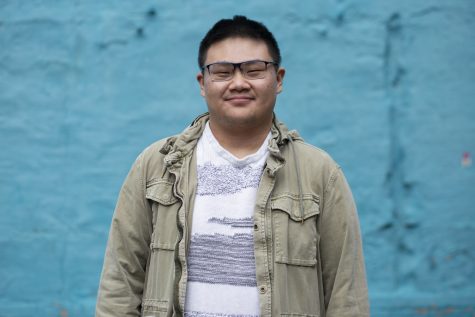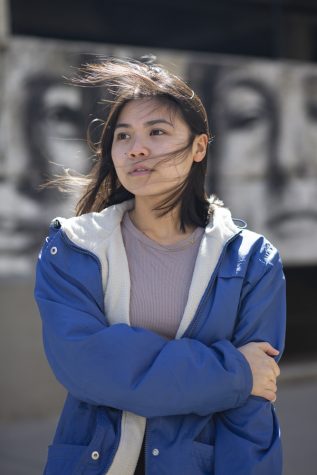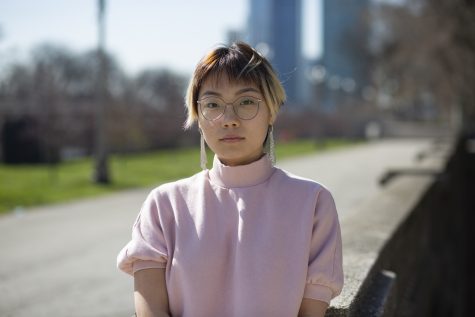Asian students speak out after recent uptick in crimes against AAPI community
April 16, 2021

Editor’s Note: The Chronicle does not condone or promote the use of the racial slur included in this article, however it is used as a point of reference and contextual evidence relevant to the story. The Chronicle warns of its use, which may cause discomfort for readers.
On the way back to his apartment one night in mid-February last year, Yu Cao and his friends encountered a person who yelled at them, “Hey, I want a fried monkey. Do you guys eat fried monkey? I always wanted to try one,” and “You should go back to China, you ch—.”
Cao, an international student from Beijing, moved to Chicago three years ago to study arts management at Columbia. He received a full-ride scholarship from the Beijing International Studies University in China.
Cao is one of many Asian students at Columbia who have experienced racism during their time in Chicago and other parts of the U.S.
In 2020, anti-Asian hate crime rates increased by 149% in the 16 biggest cities in America, according to the Center for the Study of Hate and Extremism at California State University. The number of hate crimes against Asian Americans and Pacific Islanders first spiked at the beginning of the COVID-19 pandemic in March and April of 2020.
On March 16 of this year, a man killed six Asian women and two others in a shooting rampage at three Atlanta spas.
While the suspect in the Atlanta murders has denied race was a motive, leaders and activists across the country say the incident is part of a wave of hate across the country directed at Asians and Pacific Islanders.
In February, an 84-year-old Thai immigrant died after being violently slammed to the ground in San Francisco. A 64-year-old Asian woman was assaulted and robbed in San Jose.
When Mei Ling Marzonie, sophomore filmmaking major, first heard about recent hate crimes against Asian Americans and Pacific Islanders, she felt a wide range of emotions from fear and annoyance to outrage. Marzonie said as a woman of color she has to have another layer of skepticism and caution whenever she goes outside.
“I feel that it is my duty to spread more awareness of these attacks and to amplify these other Asian American voices in order to try to help stop these attacks or to help change the mindsets of those who think that being different is bad,” Marzonie said.

Marzonie was born in China and adopted by an American couple living in Dearborn, Michigan, when she was 11 months old. She lived in Michigan until moving to Chicago for college.
Marzonie said she has felt like an outsider at times because her parents are Caucasian and the neighborhood she is from has a primarily Middle Eastern and Caucasian population.
“It’s what makes me [who I am], though I do feel bad for not really knowing my culture,” Marzonie said. “I feel that it’s never too late to begin to learn.”
Marzonie has dealt with racism throughout her life. In seventh grade, she said a boy regularly called her “Google” because she is Asian.
Marzonie was once standing at a bus stop in Michigan when a stranger across the street yelled, “What’s up, Chinatown?” to her. The stranger then proceeded to cross the street to continue to talk to her.
“I was a freshman in college; I was still learning and developing my own voice so I couldn’t do anything,” Marzonie said. “I just tried to ignore him the best I could, but at that moment I was so scared.”
Cao went to the “Stop Asian Hate” march in Logan Square on March 20 and said the AAPI community is usually non-confrontational, but was inspired by the Black Lives Matter movement to speak up.
“It’s not only [Asian people’s] issues, other minorities like African Americans, people from Central America, Latinos, we all some time in our lives [have] faced some discrimination,” Cao said.
Cao said he thinks people from different cultures do not see human rights the same way the U.S. does.
“I think a stable job and a full stomach is our human right, from [my] understanding of Asian people and from [my] understanding of Chinese people,” Cao said. “But people [in America], they want freedom of speech even though they have to fight for it.”
Kaitlyn Venturina, a sophomore filmmaking major and creative director of Columbia’s Asian Student Organization, said she enjoys cosplaying. When Ventura posted her cosplay of Velma, a character from Scooby-Doo, on Instagram, she received a comment from a stranger saying, “Isn’t Velma white?”
“At first, I was like, ‘This is so funny, come on, it’s 2020,'” Ventura said. “When it really sunk in I was like, ‘Wow, there are obviously going to be more people that are going to be like this.’ No matter what we do and no matter how much we try, there are always going to be people filled with hate and rooted in white supremacy.”

Tyra Guan, a senior arts management major and Cao’s friend, also received a full-ride scholarship to Columbia through Beijing International Studies University in her hometown, Beijing.
Guan was president of the Chinese Students and Scholars Association at Columbia from 2019 to 2020. Currently, she works as a tour guide and front desk worker at the college’s library. In these jobs, she has experienced racism and peculiar looks from strangers.
“When [people on a tour] heard that I came from China, I can tell the little difference on their face,” Guan said. “[They] probably think I’m not as professional as local American students, or they don’t understand because I have a strong accent. … But most of my tours and my guests [are] really friendly.”
Last summer, when Guan was walking down the street with her friends, a teenager appeared out of nowhere and started cursing at them and followed them.
“I was so scared,” said Guan, who was with a younger friend who is also a Chinese student. “We just keep walking … to avoid … contact with him. … It was terrifying, but we didn’t get hurt.”
Both Guan and Cao have plans to stay in America even though they are scared of the escalating number of hate crimes.
“Right now Asians are speaking up, Latinos are speaking up and African Americans are speaking up,” Cao said. “I think for most of the things you have to fight for yourself.”







